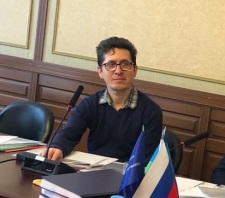
OLEG G. POLYAKOV
Dr. Sci. (Education), Professor. Derzhavin Tambov State University, Tambov, Russian Federation, Head of Linguistics and Linguodidactics Department
ORCID: https://orcid.org/0000-0002-2841-6572
RSCI: SPIN-code: 9237-2414, AuthorID: 514158
ResearcherID: А-7660-2016
Scopus: 57191782124
https://tsutmb.ru/institutes/history/about/fakultety/ped/lingvistiki-i-lingvodidaktiki/?ysclid=maxw4dykku407165374E-mail: olegpo@rambler.ru
EDUCATION
1988 – graduated with honours from Tambov State Pedagogical Institute, degree in English and German
1992–1995 – postgraduate student at the Institute of General Secondary Education of the Russian Academy of Education
1999–2002 – doctoral student at Derzhavin Tambov State University
ACADEMIC DEGREES AND RANKS
1995 – Cand. Sci. (Education), dissertation topic “Test as a means of assessment under a communicative approach to teaching a foreign language (basic course: English and German)”
1999 – Academic title of Associate Professor for the Department of Theory and Practice of Teaching English
2004 – Dr. Sci. (Education), dissertation topic “The concept of profile-oriented teaching of english in tertiary education”
2007 – Academic title of Professor for the Department of Theory and Practice of Teaching English
PROFESSIONAL ACTIVITY
1988–1991 – foreign language teacher at Stolovoye Secondary School, Tambov district, Tambov region.
1991 – laboratory assistant for the Department of German, Tambov State Pedagogical Institute
1992 – assistant teacher for the Department of English, Tambov State Pedagogical Institute
1995–2016 – Senior Lecturer for the Department of English, Associate Professor for the Department of Theory and Practice of Teaching English, Professor for the Department of Linguistics and Language Teaching at Derzhavin Tambov State University
2007–2009 – Deputy Director for Scientific Work of the Institute of Foreign Languages, Derzhavin Tambov State University
2016 – present time – Head of Linguistics and Linguodidactics Department at Derzhavin Tambov State University
AREAS OF RESEARCH INTERESTS
Applied linguistics and language teaching, continuing linguistic education, profile-oriented foreign language teaching
SCIENTIFIC AND ORGANIZATIONAL WORK
- Head of the Laboratory for Linguistics and Intercultural Communication
- Chairman of Dissertation Council 24.2.409.03 in specialty 5.8.2. Theory and Methodology of Teaching and Nurturing (Humanities, secondary vocational and tertiary education)
- Head of undergraduate programmes (44.03.01 Pedagogical Education / English; 45.03.02 Linguistics / Theory and Methodology of Teaching Foreign Languages and Cultures), master's programme (45.04.02 Linguistics / Applied Linguistics and Language Teaching) and postgraduate studies (5.8.2. Theory and Methodology of Teaching and Nurturing (Foreign Languages))
- International Examiner of English (UCLES)
Member of the editorial board of journals
- Pedagogy. Questions of Theory and Practice, chairman of the editorial board
- Psychological and Pedagogical Journal Gaudeamus, member of the editorial board
- Language and Culture, member of the editorial board
9 candidate dissertations were prepared and defended
SIGNIFICANT PUBLICATIONS OF RECENT YEARS
Articles
Student community development as a way to improve foreign language learning. Yazyk i kul’tura = Language and Culture, 2022, no. 60, pp. 176-200. https://doi.org/10.17223/19996195/60/10 (in co-authorship)
Intercultural learning in the French-as-a-second-foreign-language classroom after English. Yazyk i kul’tura = Language and Culture, 2020, no. 49, pp. 186-198. https://doi.org/10.17223/19996195/49/12 (in co-authorship)
Euphemisms, dysphemisms, orthophemisms and experiential context: a holistic view on the linguistic problem. Yazyk i kul’tura = Language and Culture, 2020, no. 50, pp. 23-40. https://doi.org/10.17223/19996195/50/3 (in co-authorship)
Cognitive modelling of the semantics of subjunctive mood (a case for the English verb would). Yazyk i kul’tura = Language and Culture, 2019, no. 45, pp. 44-63. https://doi.org/10.17223/19996195/45/4 (in co-authorship)
Personal-competency basis of philological education (foreign languages). Yazyk i kul’tura = Language and Culture, 2017, no. 40, pp. 208-228. https://doi.org/10.17223/19996195/40/15 (in co-authorship)
Developing engineering students’ skills of data and information verbalization on the basis of graphs and charts in the EFL classroom. Ponte, 2016, vol. 72, no. 7, pp. 23-31. https://doi.org/10.21506/j.ponte.2016.7.33 (in co-authorship)
Set expressions borrowed from English into German and Russian: direct loans or calques? Procedia – Social and Behavioral Sciences, 2015, vol. 200, pp. 83-86. https://doi.org/10.1016/j.sbspro.2015.08.020 (in co-authorship)
Books
Obuchenie inostrannomu yazyku na osnove tekhnologii iskusstvennogo intellekta [Foreign Language Teaching Based on Artificial Intelligence Technologies]. Tambov, Derzhavinsky Publishing House, 2023, 132 p. (in co-authorship)
Programma «Prepodavatel’ vysshego obrazovaniya i dopolnitel’nogo professional’nogo obrazovaniya po napravleniyu "Prepodavatel’ inostrannogo yazyka v vysshem uchebnom zavedenii» [Program “Teacher of Tertiary Education and Additional Professional Education in the direction of “Teacher of a foreign language in a tertiary educational institution”]. Tambov, Derzhavinsky Publishing House, 2020, 111 p. (in co-authorship)
Cognitive approach to developing grammar competence in bilinguals. Educational Bilingualism: New Language Pedagogy. Newcastle upon Tyne, Cambridge Scholars Publishing, 2019, pp. 247-258. (in co-authorship)
Teaching phonetics and encouraging students’ research work under multilingualism. Sostoyanie, problemy i perspektivy razvitiya sovremennogo obrazovaniya [State, Problems and Prospects for the Development of Modern Education]. Petrozavodsk, New Science Publ., 2019, pp. 68-78. (in co-authorship)
Directions of improving ESP learners’ communicative skills. Action Research into Teaching English in Russia’s Professional Context. Newcastle upon Tyne, Cambridge Scholars Publishing, 2015, pp. 86-97.
















